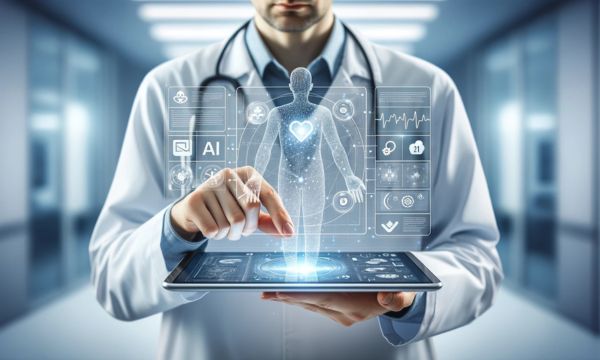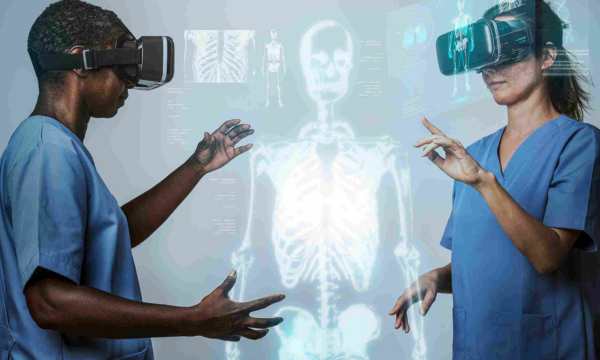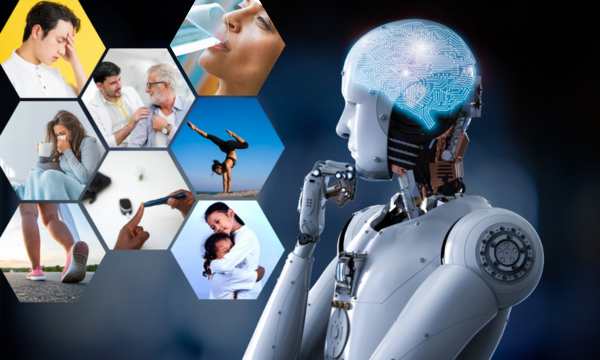As we enter 2025, the integration of artificial intelligence (AI) in healthcare continues to evolve, ushering in a new era of medical advancements and better care for patients.
Ad
This is a big year because AI technology is changing the way we diagnose, treat, and engage patients in many areas. These improvements are truly astonishing.
They are a big step towards better, more accessible, and more personalised healthcare. This guide describes the top ten AI health innovations of 2025 and shows how they will transform healthcare around the world.
Revolutionary AI Diagnostic Tools
Creating improved diagnostic tools is one of the most innovative ways artificial intelligence is being used in healthcare. These technologies leverage AI’s unparalleled ability to process and analyze very large data sets.
This makes it possible to detect diseases early with an accuracy that was previously considered impossible. For example, AI-powered image recognition systems can now detect small problems in medical images such as X-rays and MRIs.
This makes it easier to detect diseases such as cancer and heart disease earlier.
In addition, personalized care plans are developed using predictive analytics. AI algorithms can figure out which diseases a person is most likely to develop by looking at a person’s medical background, genetic information, and lifestyle choices.
They can then suggest ways to prevent you from contracting these diseases. This not only improves the quality of care but also significantly improves patient outcomes by identifying and solving health problems early.
AI-based precision medicine
People suffering from complex diseases such as cancer or rare genetic problems now have a new hope: precision medicine. Healthcare professionals can now use artificial intelligence to look at genetic data and develop treatment plans tailored to each person’s genetic makeup.
By delivering treatment at the molecular level, this approach has produced surprising results, making treatments more effective and with fewer side effects, especially in cancer patients.
The impact of AI-driven precision medicine is not limited to cancer. It opens up new ways to treat rare diseases for which there is often no standard treatment.
Researchers can use artificial intelligence to find potential therapeutic targets and accelerate the development of personalized treatments. This gives hope to people suffering from previously untreatable diseases.
Robots help with operations
In 2025, robot-assisted surgery has come a long way. Artificial intelligence-enhanced surgical robots make minimally invasive treatments more accurate. These robotic systems help surgeons perform difficult jobs with unparalleled accuracy.
This reduces the risk of complications and significantly shortens the patient’s recovery time.
Robot-assisted surgery also has benefits for the person performing the surgery. These robots can handle tedious tasks, allowing surgeons to focus on the more complex parts of the surgery, improving the overall effectiveness of the surgery.
Furthermore, adding artificial intelligence to robotic systems can make them safer and more efficient, which seems to be a brighter future for surgical practices.
Virtual health assistant
Virtual health assistants, powered by artificial intelligence, are transforming the way patients are engaged and care is managed. These smart chatbots and virtual assistants help patients 24 hours a day, seven days a week by answering their questions, telling them to take their medications, and monitoring their health.
This constant communication encourages people to be proactive about their healthcare, making them more likely to take control of their condition.
Virtual health assistants also make it easier for medical centers to handle paperwork.
By automating tasks such as booking appointments, patient follow-ups, and initial diagnoses, doctors can focus on direct patient care, improving service levels.
Health monitors and sensors you can wear
With the addition of artificial intelligence, wearable technology has become an important part of managing chronic diseases. Today, devices such as smartwatches and fitness trackers constantly monitor vital signs and other health indicators.
Artificial intelligence algorithms view this data in real-time and provide patients and caregivers with information and alerts they can use.
This ongoing monitoring can identify potential health problems early so they can be addressed quickly and prevent chronic conditions from worsening.
Furthermore, AI’s personalized feedback and recommendations can help people make informed decisions about their lifestyle, improving their overall health and preventing diseases.
AI in mental health care
Advances in artificial intelligence could also benefit mental health care. There are many applications for AI in this area, from diagnostic tools that can determine whether someone is suffering from a mental illness by looking at facial expressions and speech patterns, to therapeutic chatbots that provide support and advice.
Using artificial intelligence, virtual reality (VR) therapy creates immersive experiences to help people suffering from post-traumatic stress disorder (PTSD), anxiety disorders, and phobias.
These technologies not only make mental health care more accessible but also allow people to receive treatment tailored to their unique needs.
Tools powered by artificial intelligence are important for managing and improving mental health outcomes because they provide ongoing assistance and monitoring.
Personal health advice and guidance
Artificial intelligence is changing the way we think about health and fitness, giving us personalized recommendations on what to eat, how to exercise, and how to make changes to our lifestyle.
These platforms, which employ artificial intelligence, analyze each person’s health information and provide them with tailored recommendations to help them stay healthy and enhance their quality of life.
There are many successful cases where people’s health conditions have improved significantly with the help of AI-led education.
This proactive approach to health focuses more on prevention than treatment. It shows how artificial intelligence can lead people to a healthier and more sustainable life.
Artificial intelligence ensures that healthcare consumers are more engaged and informed by offering them personalized insights. This will lead to better health outcomes for people and population groups.
Application of AI in drug discovery and development
The pharmaceutical industry is experiencing a renaissance, with the help of artificial intelligence accelerating the drug discovery and development process. By looking at biological and chemical data, AI algorithms can find potential drugs faster than standard methods.
Implementing these changes takes less time and costs, accelerating the introduction of new treatments.
Artificial intelligence plays a major role in the fight against complex diseases because it helps find new treatment targets and treatment pathways.
The speed and accuracy of artificial intelligence in drug development heralds a future where even the most difficult conditions can be treated faster and more effectively.

AI Health Innovations (Source – Google)
Ethical issues and hopes for the future
As artificial intelligence continues to improve, it is more important than ever to address ethical issues such as data privacy, algorithmic bias, and openness. For AI technologies to work well in healthcare, they must be used fairly and responsibly.
In the future, AI has enormous potential to further improve patient care, reduce costs, and accelerate medical research. As long as AI continues to improve and is carefully integrated, it will transform healthcare in ways we can’t even imagine.
Conclusion
Finally, the top 10 AI health innovations of 2025 mark the beginning of a new era in healthcare that will make it more personal, efficient, and accessible to everyone.
As we learn more about artificial intelligence and find ways to use it, we are on the cusp of a healthcare revolution that will surely improve the lives of people around the world.
FAQs
1. How can artificial intelligence tools for diagnosing injured patients improve care?
AI-based testing tools improve patient care by detecting diseases early, allowing doctors to act quickly and dramatically improve treatment effectiveness.
2. Can AI-driven precision medicine be used for all diseases?
AI-driven precision medicine is particularly effective for genetic and cancer diseases, but can also be used for many other conditions depending on the patient’s specific needs.
3. What are the main benefits of robotic therapy?
Robot-assisted surgery has many advantages, such as greater accuracy, lower risk of complications, and shorter recovery time. These benefits can improve patient outcomes and surgical efficiency.
4. What changes will virtual health assistants bring to healthcare?
Virtual health assistants improve healthcare by providing ongoing support and engagement, making it easier for healthcare organizations to handle paperwork and encouraging proactive health management.
5. What role does artificial intelligence play in the field of mental health?
Artificial intelligence is important for mental health care because it offers new ways to diagnose and treat mental health problems. This makes mental health care more accessible and better tailored to the needs of each individual.


